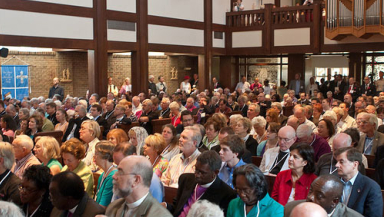
The USA is often perceived as a highly religious country, and many would argue it is an anomalously religious nation in the western world. But just how important is it to most Americans that they actually go to church?
In a study released at the end of last month by the Barna Group, where 4,495 US adults were polled, 49 per cent said attending church was either "somewhat" or "very" important. The other 51 percent said it was "not too" or "not at all" important.
When broken down by age, the trend is that the younger the generation, the less church is valued. Only 20 per cent of 'Millennials', those aged 30 or under, said they believed going to church was important.
In contrast, among those aged over 68 years old, 40 per cent regard church attendance as "very" important, and only 24 per cent regard it as "not at all" important.
The Barna Group's data goes further into the question than simple attendance, and looks into what most Americans regard as 'regular' attendance in the contemporary era.
They found that while in the past regular church attendance might have meant every week, or possibly for some people even several times each week, now many people who attend church once every four to six weeks regard themselves as 'regular' churchgoers.
Barna point out that, in the last ten years, the number of Americans who say they have not attended a church event in the last six months has jumped from 33 per cent to 40 per cent.
This is especially true for those aged between 18 and 48, of whom over 50 percent have not been to church in the last six months.
In attempting to explain the cause of the seemingly increasing malaise surrounding church attendance, the Barna Group also polled on the reasons people cite for and against their church attendance.
The most common reasons cited for church attendance by those who regard it as "important" are to be closer to God, 44 per cent, and to learn about God, 27 per cent.
The survey also noted that 22 per cent say that they attend church because the Bible teaches fellowship with other Christians, and only 10 per cent go to church looking for community, despite 20 per cent of Americans describing themselves as lonely in another Barna Group study.
But despite the strong desire of people coming to church to feel closer to God, less than 20 per cent of those who regularly attend church felt closer to God even on a monthly basis.
Only 6 per cent of churchgoers said they learned something new about God or Jesus the last time they attended church, and 61 per cent said they did not learn anything new about faith in general on their most recent church visit.
The most common reasons for not attending church given by all ages were "I find God elsewhere", a view which 40 per cent of respondents subscribed to, and "church is not relevant to me personally" , shared by 35 per cent of respondents.
Looking at the younger generation specifically, 35 per cent of Millennials said that the churches' irrelevance, hypocrisy and the moral failures of its leaders had led them to stop attending.
A further 20 per cent of Millennials said they felt that God wasn't present in the church, and 10 per cent described themselves as frustrated by the way they felt that legitimate doubts and questions were supressed by the church.













